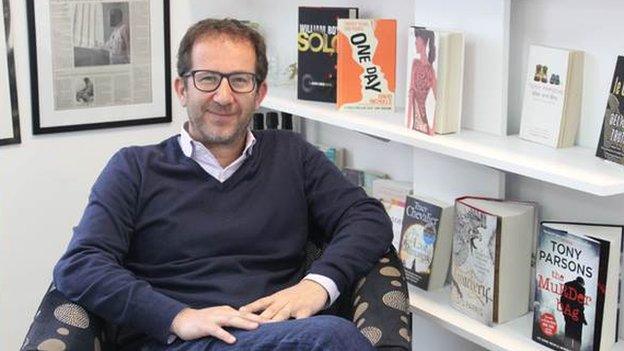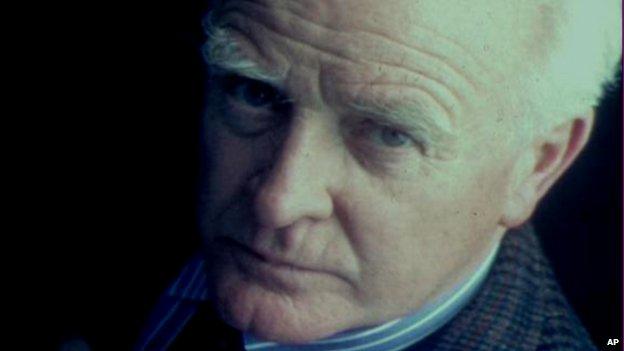Top 10 tips for being a literary agent
- Published

Jonny Geller says fighting for his authors is 90% of his job
Jonny Geller is a literary agent and the joint CEO of Curtis Brown. He represents over 40 authors including John le Carre, William Boyd, David Mitchell, Tracey Chevalier, David Nicholls and Adele Parks.
He's won several awards, including Literary Agent of the year in 2012, the same year he was named one of the most influential people in publishing by the Evening Standard newspaper.
He has been a literary agent for almost 20 years, here are his top 10 tips.
1. Find something you're good at and passionate about
I suppose I had a mid-life crisis when I was 25. I was an actor who wasn't getting auditions, and a salesman. I sold textured wall coatings (I had a terrible agent!). I decided that I didn't want to wake up at 35 and be in the same position.
A friend of mine said: 'You love books and you're good at selling, so why don't you sell books?' So I tried to get a job in publishing or book selling but couldn't, then finally I wrote a draft of a sitcom and sent it to Curtis Brown.
They called me in to basically say it wasn't good enough but six months later they offered me a job as an assistant and I've stayed here ever since.
My advice would be to get a job in an area that you love and are interested in. To me, being a literary agent is the best job in the business - you get to do everything.
2. Be prepared to start at the bottom
You have to be prepared to start at the bottom and the great thing about publishing is that everybody starts at the bottom so nobody looks down on that.
Nowadays it's all about internships, you probably have to do two or three and just try to really impress people.
To be an agent, you've got to be a person who loves people and is willing to let other people shine, without you feeling diminished. It's very important that that is something you get a buzz out of.
Someone once said to me that being an agent was like going to a party and then being left outside while the lights are going on but I don't feel like that at all.
3. Love the deal as much as you love the book
A literary agent looks after the interests of a writer. You have to deal with the commercial aspects like selling a book to publishers around the world and then there is the other side which is the career management.

John Le Carre is just one of more than 40 authors represented by Geller
The third role to this job is really to make it happen for the author, to identify what the author wants and needs and deliver that.
Being a salesman previously really helped me, I was quite good at closing the deal. For me, it was about charm and seduction but it was also about getting the result. And it's the same in publishing.
Calling your author to let them know you've got a deal is just the best feeling, that's the dream making part of the job and I love it.
You have to love the deal as much as you love the book and vice versa because there is no point in an agent who can't do a deal and an agent who can't read your work is no good either. I want my authors' books to be read in 50 years' time and so it has to work. I invest in far more than just the deal, it's just the beginning.
4. Choose your clients carefully and be decisive
I look after more than 40 active writers. Some people write a book every five years, some people write one every 12 months and the conversations I'll have with John le Carre are totally different to a conversation I'll have with a debut novelist.
You need to be confident, very decisive and opinionated, I'm afraid. Authors expect you to have the expertise, experience and instinct to tell them what to do and then they can decide whether they agree with you or not.
I do have to say no to people now but I'm still addicted to the new, that's what the job is about.
5. Look for career writers
We get around 13,000 manuscripts a year and I'm looking for someone who is a career writer. There was a statistic recently about self-publishing that 75% of those asked said it was a hobby for them. I'm interested in the other 25%.
I'm interested in people who are obsessed with writing, who cannot not write. It's a very peculiar and distinct little group of people who will make their living as a writer.
My job really is to identify somebody who can write a story in a way that only that person could have written it. If I can identify that voice then I'm half way there. It is easier to help someone with a story if they can write, than the other way around.
6. Fight for your authors
We have to make a decision, very quickly really, that we believe in that author in the long-term. When I engage in a relationship with an author, I'm behind them 100% and fighting for your authors is 90% of the job.
For me, rejection is a part of my job but I don't pay any attention to it because they're always wrong. Once a publisher turns down my book, they don't exist for me. That's really the way it has to be.
It's my job to make sure that everyone is working at the highest level because if you believe in your authors, which I do, they deserve it. They've done their work, you do yours.
7. Get involved in the whole process, the cover, the blurb and the PR
I think there will always be a need for literary agents because an author must have an objective friend. A publisher is there to make money out of an author's book but they're not on their side.
I don't like the term agent anymore, I feel like I'm much more of a manager. I help with the worldwide PR for some of my clients, I do editorial and I help with blurbs and the covers and getting other authors to engage with their work. I'm virtually managing the process.
Publicity is very important because people are intrigued and interested in authors and part of my job is to protect them. It certainly doesn't matter if an author is good looking or not because sometimes that actually gets in the way funnily enough.
I think social media is really interesting, because I don't think it works for most writers.
I think there is a mystery behind certain writers that social media destroys and actually what they're doing is giving material away for free!
8. Be honest with your clients
Sometimes writers need help and some writers have to learn to survive their success. One of the key things in your relationship with them is trust, your authors have to be able to trust you.
And not just with financial matters, they need to trust you to read their book and tell them the truth and that is one of the hardest things about the job. If an agent isn't 100% convinced by something a writer has sent them, they can either tell them the truth and risk their relationship, or pass it to the publisher and have them do their dirty work for them.
I have never once not chosen the path of telling the truth, because they will respect you more and nobody, touch wood so far, has walked out because I've been honest enough to say when something needs a lot of work. Communication is very important.
9. Read a lot and be curious
I do read a lot. I read my own author's manuscripts more than anything else and when on holiday I tend to read a bit of non-fiction because it's like a breath of fresh air.
Be curious, be open to new ideas. You could be sitting here telling me about something and I could be thinking that it is a terrible idea, but it might be disguising a very good one. I think the ability to turn that around and get you to write and use your talents in the right way is a huge part of being an agent.
Many proposals have been changed in this room and it's not about getting authors to write the book that you want them to write, it's about listening to them and finding out why they're not writing the right book. Listening is very important.
10. Believe in your instinct and don't take it all too seriously
Relax and believe in your instinct, because that's what you will live and die by. If you believe in the right people it will be ok in the end.
The work of your authors and their trust in you is deadly serious, but it's a huge privilege to work in the creative industries, it's not real work so don't take the job or yourself too seriously.
There are lots of books that got away. There were lots of books that I believed were significant but didn't make it, including my first book.
It's important to remind yourself that you are not really in control of anything and learn from your experiences.
You need to have a sense of humour and try to do some good. Try to remember what it was like when you were a mad obsessive reader at the age of 17 and just remember that person because that's the person who matters, not the wise old agent who seems to know everything but doesn't.